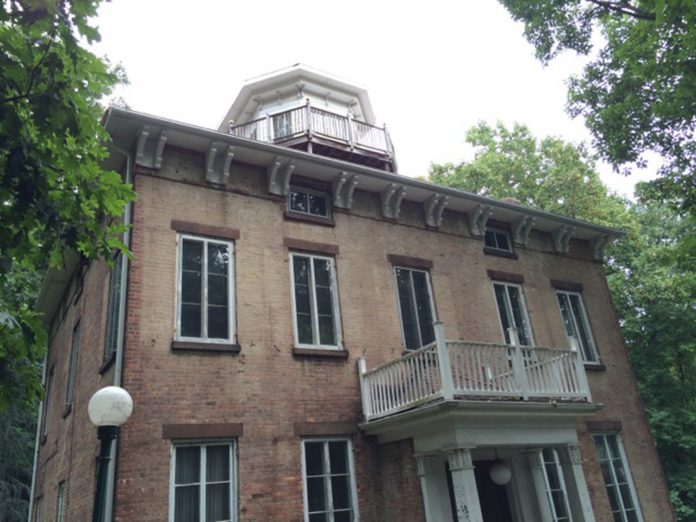STATEN ISLAND, N.Y. — Although New Yorkers may associate Greenwich Village or Park Slope with New York City’s cultural hubs for the LGBTQ+ community, Staten Island has a long history of pride and pain of its own.
Dating all the way back to the early twentieth century, there is evidence that the LGBTQ+ community has been calling Staten Island home for some time. While the Island still has mountains to move to be an inclusive space, a look back at the local history helps understand how far the LGBTQ+ community has truly come on Staten Island.
From the Island’s first gay bar to hate crimes to the first same-sex marriages, take a look through the timeline of Staten Island’s LGBTQ+ history. This history is not all-inclusive, and it’s important to note that the Advance/SILive.com archives do not represent the entire history of a community that has been – and still is, to an extent – closeted for many years.

Graham Marr renamed The Wyeth House at 190 Meisner Ave, where he and his partner Norman Robert Morrison lived, to “Marr Lodge.” (Advance File Photo)Staff-Shot
Marr Lodge is a lesser-known historical LGBTQ+ site on Staten Island. It became the home of partners Graham Marr and Norman Robert Morrison in 1925, according to an Advance/SILive.com article in 2010. The Lighthouse Hill manor is protected by the NYC Landmarks Preservation Commission.
Mayfair Bar & Grill was one of the first recorded gay bars on the Island, located at 3 Hyatt Street, according to NYC LGBT Historic Sites Project. It remained a popular bar well into the 1970s.
Beach Haven opened around 1963 and by 1971 it became a popular lesbian bar on the Island, according to NYC LGBT Historic Sites Project. Lesbians were more likely to frequent the bar than previously mentioned Mayfair Bar & Grill, which was more popular among gay men.
“Gay Lib, Richmond College” was a group established at the college, today’s College of Staten Island (CSI), according to NYC LGBT Historic Sites Project.
An ad was placed in the Staten Island Community College (SICC), Today’s CSI, for a meeting of “the gay people at SICC,” according to NYC LGBT Historic Sites Project. It would eventually become the “Gay Liberation Club.”

A 1985 file photo shows writer, lesbian, feminist, and civil rights activist Audre Lorde. (Advance File Photo)Staten Island Advance
Audre Lorde is a renowned lesbian poet who lived in a home at 207 St. Paul’s Avenue until 1987.
Arnie Kantrowitz, a professor at SICC, taught “Homosexuals & Literature,” which covered Walt Whiteman to Rita Mae Brown. It was one of the first courses of its kind in the country, according to NYC LGBT Historic Sites Project.
Lambda Associates of Staten Island (LASI) was founded in 1981 and incorporated in 1983, according to the Staten Island Museum. Their organization had a mission to “institute and promote a Social, Cultural, and Educational association on Staten Island for Gay Men and Women.”
The Staten Island AIDS Task Force was formed in 1988 and was located at 25 Hyatt Street, according to NYC LGBT Historic Sites Project. This organization would pave the way for today’s Pride Center of Staten Island.

A silent sadness at murder scene of James Zappalorti, a gay man who was stabbed to death in Charleston. (Advance File Photo)STATEN ISLAND ADVANCE
The most notorious LGBTQ+ hate crime on Staten Island was the murder of James Zappalorti. He was stabbed to death by two men at his home in Charleston on January 22, 1990. Protests ensued in the following days and months, calling for LGBTQ+ tolerance and inclusion. His killer, Michael Taylor, told authorities that he “didn’t like queers” and thought Zappalorti would be an easy target for robbery because he was gay.
This year, 1990, was the first one on Advance record that Island LGBTQ+ organizations applied and were barred from marching in Staten Island’s St. Patrick’s Parade. In March 2022, The Pride Center of Staten Island was still denied from participation in the parade by the hosts, the Ancient Order of Hibernians.

An undated file photo shows Mitchell Grubler, the former director of the Alice Austin House Museum. (Advance File Photo)
After submitting Alice Austen’s photography to be used in an exhibition titled “Becoming Visible: An Illustrated History of Lesbian and Gay Life in Twentieth-Century America,” then-director of the Alice Austen House Museum, Mitchell Grubler, was fired from his position at the museum, according to an interview with The New York Archive Preservation Project.

This an anti-gay billboard was photographed on Bay Street near the corner of Slosson Terrace on March 4, 2000. (Staten Island Advance File Photo)Staten Island Advance
On Bay Street, near Slosson Terrance, an anti-gay billboard was posted. The billboard sparked a prayer vigil by LGBTQ+ activists and a rally at borough hall by Islanders protesting the removal of the signs. Rev. Kristopher Okwedy of Keyword Ministries paid for two billboards, which he was forced to remove by then-borough president Guy Molinari. Okwedy would go on to claim that his first amendment rights were violated by Molinari, a case that was dismissed by the court and brought back by the reverend several times through 2006. In 2006, he claimed, “Homosexuals have a preferred position in the city over Christians,” while his case was again awaiting a ruling.

Jamie Gange, a senior at Tottenville High School in the 2003, started the Gay-Straight Alliance at his school. (Staten Island Advance File Photo)Staten Island Advance
Gay-Straight Alliances (GSAs) were founded at Curtis High School, Staten Island Technical High School, and Tottenville High School. Jamie Gange, a then-rising senior at Tottenville High School, started the GSA at his school after feeling unsafe as a transgender male at school, he told the Advance/SILive.com in 2003.
A letter claiming that then-Senate candidate Diane Savino was a lesbian was written in her name in an attempt to defame her in November of 2004. Savino would later attempt to have criminal charges filed against those who wrote the letter in January 2005.

Gabrielle Jimenez of Grymes Hill and Hope Steinman-Iacullo of Midland Beach, both 18, also marched in Staten Island’s first Pride Parage. Gabrielle spoke out about what it’s like to be a gay teen: “Kids yell out ‘f—–‘ from their cars.” (Staten Island Advance File Photo)
The first Pride Parade on Staten Island was held on June 4, 2005. What started as a peaceful event ended up in an arrest after Pleasant Plains resident Mike Veach harassed marchers along the Midland Beach promenade. He would later be charged with aggravated assault.
On July 7, 2006 the New York Court of Appeals ruled that same-sex marriage was not protected under law. Wayne Steinman, who unofficially married his since passed longtime partner Salvatore Iacullo in 2003, told the Advance/SILive in 2007, “Our highest court has enshrined discrimination based upon fallacies and antiquated ideas about marriage.”
Hush opened on November 16, 2006, which the Advance/SILive.com described as “a gay nightclub that’s not being kept under wraps” on the Island.
The announcement that New Jersey would begin offering civil unions was met with both excitement and disappointment by Staten Islanders. Islanders Marty Finkle and Michael Plake applied for their license at the South Orange town hall, explaining that it was “as close to marriage as we’re going to get for right now.”

A 2010 file photo showing Assemblyman Matthew Titone talking about his experience being a gay man on Staten Island. (Staten Island Advance photo/Hilton Flores)Staten Island Advance
Matt Titone, an openly gay man, was elected as a member of the New York State Assembly for the 61st District, located on Staten Island’s North Shore. While Titone recently said he faced some blatant discrimination during the campaign process, he told the Advance/SILive.com there were also “dozens of Staten Islanders and strangers, who had nothing but comforting and encouraging words for me. Sentiments along the lines of, ‘your courage alone has earned my vote.”’
Former Mayor Michael Bloomberg signed a bill that ensured that all same-sex domestic partners would receive the same prospective benefits and services that New York City offered married couples. Then-City Council Speaker, Christin Quinn, said, “We’re only comfortable when all New York families are treated equal to the greatest degree the municipal law can, and that’s what this bill will do.”

Oscar Acosta and his partner, Paul Incherchere, stand in front of racist and anti-gay remarks written on a building across the street from their home. (Advance File Photo)staten island advance
A remark was left on the door of a Garber Lumber Co. building at 72 Greenfield Avenue, which partners Oscard Acosta and Paul Incherchere who lived across the street believe were targeted toward them. The sign reads: “Mexicans are perverts and need to stop coming to America!”

City Council Speaker Christine Quinn greets former Advance Woman of Achievement Teri Russo at the opening of the LGBT Community Center on Victory Boulevard in Tompkinsville. (Advance File Photo)STATEN ISLAND ADVANCE
The Community Health Action of Staten Island (CHASI) unveiled its new LGBT Center at 25 Victory Blvd on May 17, 2008. The opening center was the first time that CHASI would have all of its LGBTQ+ services under one roof, and later became the first home of the Pride Center of Staten Island.
Eric Aversa and Annette Silvestro opened a new division, Passages, at Majors Travel in West Brighten tailored toward gay, lesbian, bisexual and transgender customers.

Richard and Lois Nicotra are pictured at Staten Island’s first Gay Life Expo at the Hilton Garden Inn. (Advance File Photo)
The Gay Life Expo came to Staten Island for the first time on Jan. 25, 2009. It was held at the Hilton Garden Inn in Bloomfield and became an annual event on the Island.

Sas Velez shows off herTt-shirt from Q-SINY, the only gay bar and restaurant on the Island in 2009. (Advance File Photo)SI Advance
Q-SINY opened right after the Pride Parade in June 2009, becoming the Island’s only gay bar at the time. The restaurant was opened by Jim McKernan and his longtime partner Ray Carr in Midland Beach.

Wayne Steinman of Midland Beach and Rose Ellicott of Eltingville hold a banner at the Borough Hall vigil for same-sex marriage. (Advance File Photo)Staten Island Advance
Island LGBTQ+ organizations, activists and residents came together for a candlelight vigil on the steps of Borough Hall to show support for same-sex marriages on the eve of a state legislature vote on the issue. The next day, the legislature voted against same-sex marriages.
To ensure a welcoming, all-inclusive campus, the College of Staten Island retrofitted about 20 of its restrooms – one in each building – to be gender-neutral and family-friendly, making it the first educational institution in the borough to do so.
The city began allowing civil ceremonies for LGBTQ+ individuals in June 2010; previously, same-sex couples were only eligible to receive paperwork attesting to their union. However, the Advance/SILive.com reported that there were “no takers” and that some couples would not participate in ceremonies because they deserve full marriage equality.

Billie Love, Julia Graniela, Jenna Pantophlet, Sarina Valerie Bello, Mandi Myth, Tisha Seaten, Ashley Paulsell, and Quantiasha Williams, from left, attend Staten Island’s first LGBT prom in the Staten Island LGBT Center in Tompkinsville. (Advance File Photo)Staten Island Advance
Staten Island’s LGBTQ+ youth were able to have a prom of their own for the first time, thanks to the LGBT Center. The event still exists today, hosted annually in May by the Pride Center of Staten Island.

Luis and Richard Vieira were assaulted at a the White Castle in Stapleton in July 2010. (Advance File Photo)Staten Island Advance
A meeting was held at the LGBT Center after Luis and Richard Vieria were assaulted at a White Castle in Stapleton. The assault was described as a “gay bashing attack” by the Advance/SILive.com.
For the first time, the LGBT+ community was allowed to march in the annual Staten Island Columbus Parade. Gerard Mawn of Castleton Corners remarked, “I think it’s vitally important that there’s an LGBT community on Staten Island.”

Demonstrators rally at Hylan Boulevard and New Dorp Lanes to make sure all motorists and pedestrians are aware that bullying of all kinds needs to end. (Advance File Photo)
After a two-week span that saw a Rutgers University college freshman take his own life, a man beaten by two Staten Islanders in a gay bar in Manhattan, and a hate-filled gang attack on homosexuals in the Bronx, Gabrielle Carlino and more than 40 residents took to the streets to say they’ve had enough. The gatherers held white signs that read phrases, such as “Be a Buddy, Not a Bully,” “Stop Anti-Gay Bullying Now!” and “Being Who You Are Shouldn’t End Your Life.”
After the bill was signed, now passed LGBTQ+ activist Jim Smith, who came out before the seminal Stonewall riots of 1969, told the Advance/SILive.com while choking back tears, “I knew the pain, the isolation and the loneliness, the backrooms. I never dreamed that this could happen or would happen in my lifetime. Young kids today don’t know what it was like then.”

As Justice Thomas P. Aliotta looks on, Belinda Sanchez puts the wedding ring on Lavren Rivera on July 24, 2011. (Staten Island Advance/Hilton Flores)Staten Island Advance
At the end of the day on July 24, 2011, the first day that same-sex couples could legally marry in New York, 41 marriage licenses had been issued on Staten Island. Pictured are Belinda Sanchez and Lauren Rivera, the first same-sex couple to be married on Staten Island.

Graduates Jeremiah Jurkiewicz, Erin Cassidy with her four-month-old son Leonardo Duran, and Amanda Holbert pose for a photo at the CSI Lavender Graduation Reception. (Staten Island Advance/Anthony DePrimo)Staten Island Advance
CSI hosted its first-ever Lavender Graduation on May 30, 2012, which recognized the students in the school’s LGBTQ+ community. Graduate Jeremiah Jurkiewicz commented, “CSI has shown me I do not need to compromise who I am to be successful. I shouldn’t have to work or do something I don’t feel comfortable with being myself because there are places like CSI that will accept me for who I am.”
Twenty-three years after inmate Michael Taylor killed James Zappalorti, a state parole board determined his “brutal, merciless and hate-filled actions” make him a continuing danger to society. The parole board wrote in it’s parole denial that Taylor’s “brutal, merciless and hate-filled actions against your unarmed and restrained victim because of his sexual orientation” demonstrate “extreme danger” to society.
The decision of the groundbreaking Supreme Court case Obergefell v. Hodges struck down all state bans on same-sex marriage.
The Community Health Action of Staten Island (CHASI) and the LGBTQ Community Center combined forces, allowing the Pride Center of Staten Island to become a fully independent organization.

Staten Islanders gathered to embrace the history, lifestyle and love of Alice Austen and her partner of 53 years, Gertrude Tate at the official designation of the Alice Austin House. Pictured is Janice Monger, Executive Director of the Alice Austen Museum, addressing the crowd. (Staten Island Advance/ Victoria Priola)Staff-Shot
After years of attempts to be recognized as a LGBTQ+ historical site, the Alice Austen Museum received national designation on June 20, 2017.

Zoë Tirado and Jenno Snyder pose at the table of an exhibit entitled “Comfort Food” consisting of pills, beer cans, and toilet paper holders. The piece is part of the Queer Van Kult + Revelation Exhibition at the Newhouse Center for Contemporary Art in Snug Harbor on Wednesday, June 8, 2022. (Staten Island Advance/Jason Paderon)Jason Paderon
Formed by Staten Islanders Zoë Tirado, Jenno Snyder, Rachel Lyngholm and Nicie Mok, Queer Van Kult — a play on Kill Van Kull, a body of water between Staten Island and New Jersey — is a unique art collective of “experimental queer performance and installation” meant to highlight LGBTQ+ locals working in new media and performance art.

Miranda Paredes, Fanny Romero Cabello, Jessica Aquino Garcia, Alexa Arizmendi Garcia, and Alejandra Moran Juarez filed a lawsuit against USCIS and officials from the DHS. (Staten Island Advance/Shira Stoll)
Five transgender women from Staten Island filed a lawsuit against the United States Citizenship and Immigration Services (USCIS) and officials from the Department of the Homeland Security (DHS), claiming they have been waiting for an interview on their asylum case for almost three years – something that should be happing 45 days after filing an application, according to USCIS policies.
As a part of an initiative to recognize Black Americans, an area of Silver Lake Park was renamed Audre Lorde Walk, named after Black lesbian feminist, writer and activist who formerly lived on Staten Island.

Karyn Bello created her own fashion line of lingerie designed for transgender women. (Staten Island Advance/ Jan Somma-Hammel)
Seven years later, after her daughter came out as transgender, South Shore mom Karyn Bello created her own fashion line of lingerie designed for transgender women and hopes to be an example for parents of transgender people.
More “This Is Pride” stories:
This Is Pride portrait: Nicholas Robinson, an activist for HIV awareness, prevention







